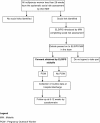Evaluation of Lay Support in Pregnant women with Social risk (ELSIPS): a randomised controlled trial
- PMID: 22375895
- PMCID: PMC3349581
- DOI: 10.1186/1471-2393-12-11
Evaluation of Lay Support in Pregnant women with Social risk (ELSIPS): a randomised controlled trial
Abstract
Background: Maternal, neonatal and child health outcomes are worse in families from black and ethnic minority groups and disadvantaged backgrounds. There is little evidence on whether lay support improves maternal and infant outcomes among women with complex social needs within a disadvantaged multi-ethnic population in the United Kingdom (UK).
Method/design: The aim of this study is to evaluate a lay Pregnancy Outreach Worker (POW) service for nulliparous women identified as having social risk within a maternity service that is systematically assessing social risks alongside the usual obstetric and medical risks. The study design is a randomised controlled trial (RCT) in nulliparous women assessed as having social risk comparing standard maternity care with the addition of referral to the POW support service. The POWs work alongside community midwifery teams and offer individualised support to women to encourage engagement with services (health and social care) from randomisation (before 28 weeks gestation) until 6 weeks after birth. The primary outcomes have been chosen on the basis that they are linked to maternal and infant health. The two primary outcomes are engagement with antenatal care, assessed by the number of antenatal visits; and maternal depression, assessed using the Edinburgh Postnatal Depression Scale at 8-12 weeks after birth. Secondary outcomes include maternal and neonatal morbidity and mortality, routine child health assessments, including immunisation uptake and breastfeeding at 6 weeks. Other psychological outcomes (self efficacy) and mother-to-infant bonding will also be collected using validated tools.A sample size of 1316 will provide 90% power (at the 5% significance level) to detect increased engagement with antenatal services of 1.5 visits and a reduction of 1.5 in the average EPDS score for women with two or more social risk factors, with power in excess of this for women with any social risk factor. Analysis will be by intention to treat. Qualitative research will explore the POWs' daily work in context. This will complement the findings of the RCT through a triangulation of quantitative and qualitative data on the process of the intervention, and identify other contextual factors that affect the implementation of the intervention.
Discussion: The trial will provide high quality evidence as to whether or not lay support (POW) offered to women identified with social risk factors improves engagement with maternity services and reduces numbers of women with depression. MREC NUMBER: 10/H1207/23
Trial registration number: ISRCTN: ISRCTN35027323.
Figures
References
-
- Department of Health. National Service Framework for Children, Young People and Maternity Services. 2004. - PubMed
-
- Department of Health. Maternity Matters: Choice, access and continuity of care in a safe service. 2007.
-
- CEMACH. Saving Mothers' Lives 2003-2005 - Reviewing maternal deaths to make motherhood safer. London: RCOG Press; 2007.
Publication types
MeSH terms
Associated data
Grants and funding
LinkOut - more resources
Full Text Sources
Medical


